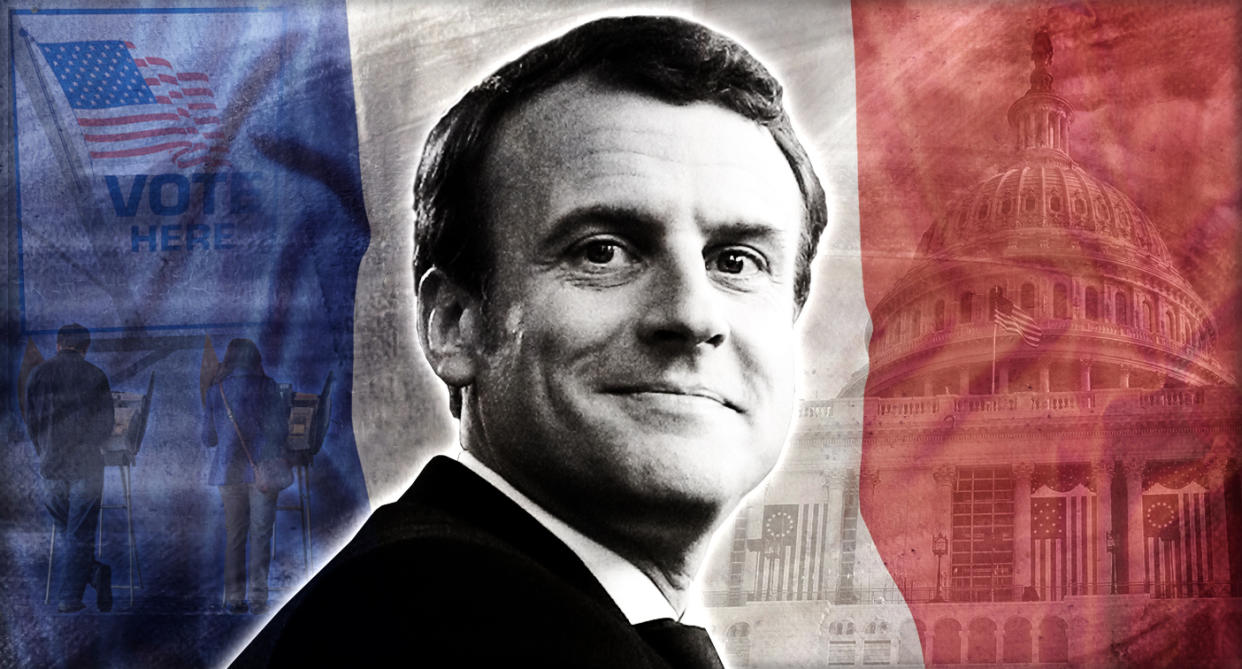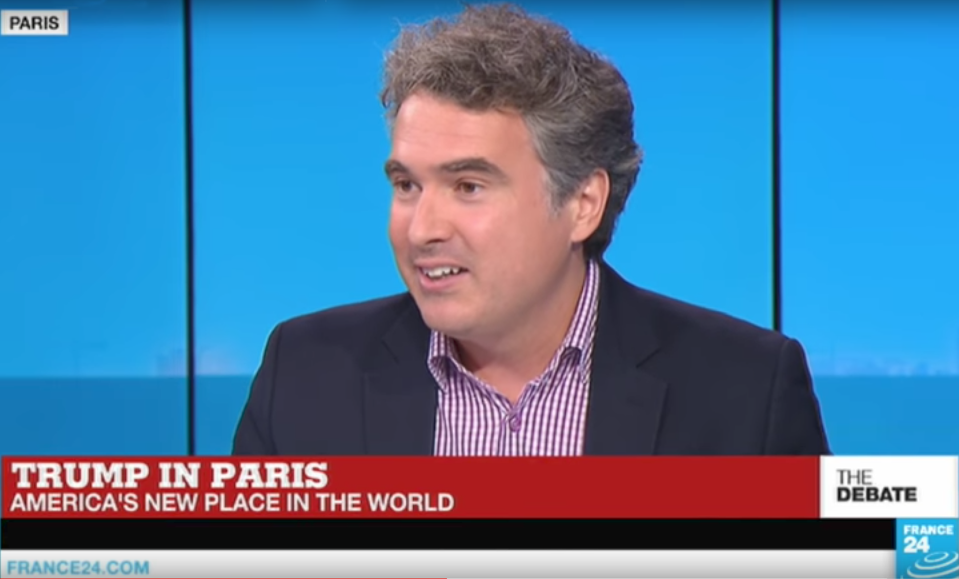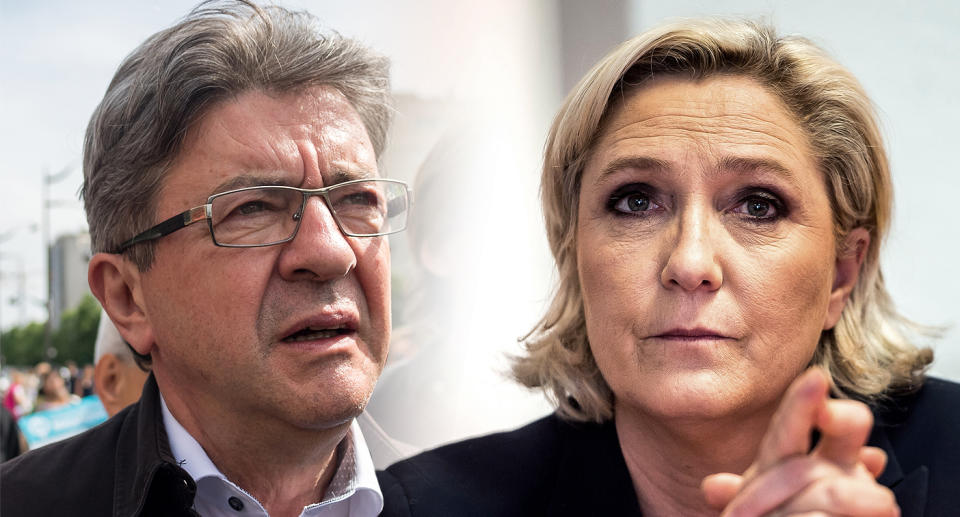Macron’s shocking win inspires Americans plotting independent 2020 bid

WASHINGTON — American political operatives planning an independent run for president in 2020 against President Trump are studying French President Emmanuel Macron’s astonishing rise to power this past spring as they seek to lay the groundwork for what they hope will be a political miracle here in the U.S.
“There are a few people out there right now who know what it takes to run and fund a presidential campaign who are having serious conversations about what 2020 looks like. In fact, we are planning for it,” said Joel Searby, a Florida-based Republican who was a senior adviser to Evan McMullin’s independent bid for president last year.
Searby is talking with Democrats like Michael Slaby, a top technology and digital adviser to Barack Obama’s 2008 and 2012 presidential campaigns.
“Joel and I are talking a lot and sharing a lot of thoughts,” said Slaby, who provided advice to Americans working on the Macron campaign team to help them think about how to identify and recruit supporters.
Slaby, 39, said he has not “given up on the parties that we have entirely.”
“I’m thinking more about where we’re going to find leadership from, period,” he said. “There are people on both sides of the aisle who have integrity and are trying to lead. They just tend not to be the people in power in their parties.”
Searby, 36, has talked with members of the Macron team as well to glean insights into how an American campaign might take off.
There has been no shortage of speculation about celebrities and business executives who might launch an outsider campaign for president in 2020. Some of the prominent names floated include Dallas Mavericks owner Mark Cuban, Facebook founder and CEO Mark Zuckerberg, movie star Dwayne “the Rock” Johnson, Oprah Winfrey of film and television fame and Starbucks CEO Howard Schultz.
Slaby’s main point of contact on the Macron campaign was Lex Paulson, who worked in small state organizing positions on Howard Dean’s 2004 presidential bid and Obama’s 2008 campaign and then worked on Capitol Hill as a legislative aide to Rep. Jim Himes, D-Conn.

Paulson, 37, went to France to study for a PhD and was there as Macron began to lay the groundwork for a long-shot run for the French presidency in 2016. “They needed someone who had experience in voter contact and volunteer training, and just door-to-door methodology. No one really in France had done that before,” Paulson said in an interview.
When Macron launched his campaign, most observers expected former Prime Minister Fran?ois Fillon to easily win the election. But Macron — a product of France’s elite universities and a former finance minister — created a new political party, En Marche! (In Motion!), and began to pioneer a kind of politics that France had not seen before.
“The traditional way of doing campaigning in France is big rallies and passing out fliers at metro stations,” Paulson said.
But Macron’s campaign invested most of its effort in identifying grassroots supporters and empowering them to recruit and build their own teams of volunteers. It was a model built on Obama’s 2008 campaign.
After Fillon’s candidacy was sunk by a scandal involving a no-show job he had given his wife, the French election looked like it might be a choice between far right populist Marine Le Pen and far left liberal Jean-Luc Mélenchon. Macron, having spent a year planning and preparing for such an opening, emerged from the “radical center” and gained a shocking victory in the spring election. He easily defeated Le Pen in a runoff by a ratio of 66 to 34 percent.
“Three years ago I didn’t know who the hell he was, and nobody in France did. He came out of nowhere,” said Robert Zaretsky, a professor of French history at the University of Houston.
Paulson said that any independent candidate in the U.S. would need to have a combination of preparation and some huge lucky breaks to be successful. He has a mixed view of whether the political environment in the U.S. is right for such a run.

“It required the background condition of major disillusionment with the political system and desire for change, an openness to outsiders, that’s true everywhere in the Western world right now, maybe outside of Germany,” Paulson said.
And while Paulson certainly sees the Republican Party as riven with divisions, he does not believe the Democratic Party in the U.S. is as fractured, or as far to the left, as France’s left wing was.
“You’re starting to see a way in which Republicans become either split or paralyzed by a multiyear White House scandal, split between the hardcore Trump supporters and those who defect. I don’t see those kind of fissures in the Democratic side,” Paulson said. “Unless there’s some other kind of massive event that splits … major constituencies inside the Democratic Party, apart from one another, the Democratic coalition seems relatively united against Trump.”
Slaby, however, said he is worried that fellow Democrats are not addressing basic problems of disenfranchisement that discourage many voters from participating in politics at all. He said he and Searby “don’t agree on much, but we agree on kind of like everything that matters about what’s broken in politics: the lack of integrity and lack of values, and the money problems, and the structural problems, and the corruption and the redistricting — all the systemic things that make politics feel broken and make it feel like politicians aren’t really working for the people they represent.”
And Searby said he doesn’t think Democrats have “a compelling vision for our future that lines up with the basic ideas that most Americans have about how things should work in the federal government.”
“Specifically, while social tolerance and environmental responsibility are hallmarks of the coming generation, they also are not clamoring for socialized medicine, a massive federal government with huge taxes or restrictions on freedoms of speech, religion and the internet,” Searby said. “They are working their tails off in the ‘gig economy’ and want to not only remove barriers to their success but want the government to stay out of their way: Don’t overregulate, overtax or tip the scales. Those are not values the Democratic Party supports.”
The obstacles to an independent run in America are many and they are significant. Simply getting a candidate on the ballot in all 50 states is a monumental task. And building up the volunteer infrastructure in each state to stand up an organization is a difficult and time-consuming process.
America’s elections are far bigger, more expensive affairs, so fundraising is another massive challenge for any new party. But with the advent of small-donor fundraising and super-PACs, a candidate who captures the imagination of enough people could overcome that hurdle.
At the heart of what seems to drive operatives like both Searby, who comes from the right, and Slaby and Paulson, who come from the left, is a dissatisfaction with the obsession over national politics and federal government, all of which perpetuates a sense of powerlessness in people who are too far removed from the people and processes involved.
“I’m a true believer in less centralized control and more compelling ideas that people can rally around and make their own, for the benefit of their communities,” Searby said.
Paulson voiced a yearning to promote greater “participatory democracy” by pushing power down away from the national and federal level.
“I think the problem with democracy over the entire world is that we’re living with these 18th century representative models that have put a huge, huge premium on voting in national elections as the ultimate expression of citizenship and popular sovereignty. I just think that what that’s done is it’s exacerbated this problem of national elites who are far away from voters, and it’s given openings to demagogues and populists and extremists,” Paulson said. “To me, the only long-term solution to that is not electing better national leaders, it’s shifting the focus or adding a focus on local horizontal distributed systems of political change and year-round citizenship and not just who we vote for in a national election.”
Paulson said that despite his involvement with Macron, he thinks “the way to disrupt political party systems [in the U.S.] is not a moonshot. It’s opportunistic disruption at a slightly lower level.”
“I think being disruptive at the state level to me would have a much higher likelihood of success than a moonshot of a national independent candidate,” Paulson said. “Find states where one party is dominant, whether the other party is demobilized, demotivated, etc., and where there’s an opening to run a slate of candidates for a statewide office.”
But Macron’s example has ignited the imagination of many American observers.
“It seems that American politics has long been allergic to an independent running for the presidency. It hasn’t worked. It didn’t even work for Teddy Roosevelt. Here’s the thing, though. People were saying the same thing about France,” Zaretsky said. “If it happened in France, why not here? It’s one of the things that allows me to sleep at night.”
Read more from Yahoo News:
Lawyer wants Trump’s testimony in ‘fake news’ suit against Fox
Judge orders FBI to probe records of 1950s program that purged federal LGBT workers
Something there is that doesn’t love a wall. Does poetry matter in the age of Trump?
Photos: In Middletown, addiction’s toll: Faces, places – and headstones


